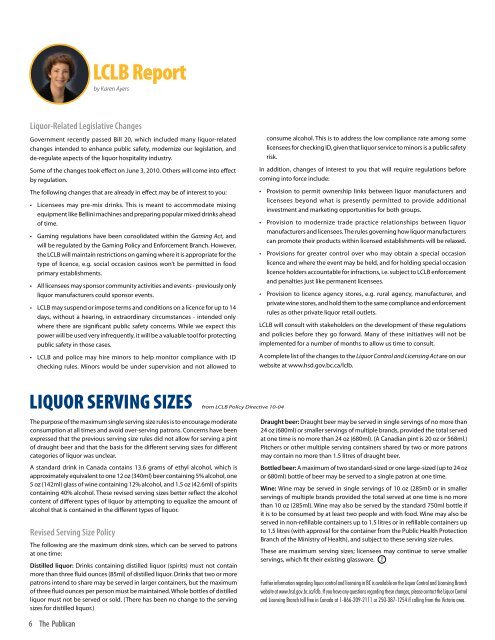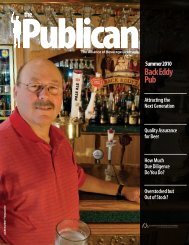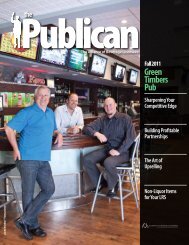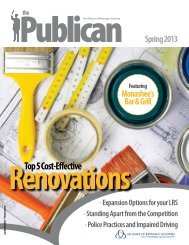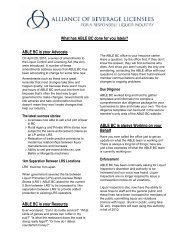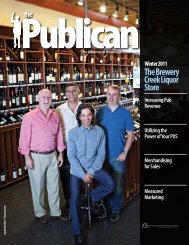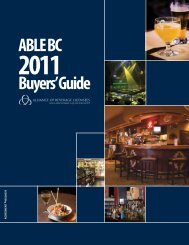The Spike Pub & Liquor Store - ABLE BC
The Spike Pub & Liquor Store - ABLE BC
The Spike Pub & Liquor Store - ABLE BC
You also want an ePaper? Increase the reach of your titles
YUMPU automatically turns print PDFs into web optimized ePapers that Google loves.
LCLB Report<br />
by Karen Ayers<br />
<strong>Liquor</strong>-Related Legislative Changes<br />
Government recently passed Bill 20, which included many liquor-related<br />
changes intended to enhance public safety, modernize our legislation, and<br />
de-regulate aspects of the liquor hospitality industry.<br />
Some of the changes took effect on June 3, 2010. Others will come into effect<br />
by regulation.<br />
<strong>The</strong> following changes that are already in effect may be of interest to you:<br />
• Licensees may pre-mix drinks. This is meant to accommodate mixing<br />
equipment like Bellini machines and preparing popular mixed drinks ahead<br />
of time.<br />
• Gaming regulations have been consolidated within the Gaming Act, and<br />
will be regulated by the Gaming Policy and Enforcement Branch. However,<br />
the LCLB will maintain restrictions on gaming where it is appropriate for the<br />
type of licence, e.g. social occasion casinos won’t be permitted in food<br />
primary establishments.<br />
• All licensees may sponsor community activities and events - previously only<br />
liquor manufacturers could sponsor events.<br />
• LCLB may suspend or impose terms and conditions on a licence for up to 14<br />
days, without a hearing, in extraordinary circumstances - intended only<br />
where there are significant public safety concerns. While we expect this<br />
power will be used very infrequently, it will be a valuable tool for protecting<br />
public safety in those cases.<br />
• LCLB and police may hire minors to help monitor compliance with ID<br />
checking rules. Minors would be under supervision and not allowed to<br />
consume alcohol. This is to address the low compliance rate among some<br />
licensees for checking ID, given that liquor service to minors is a public safety<br />
risk.<br />
In addition, changes of interest to you that will require regulations before<br />
coming into force include:<br />
• Provision to permit ownership links between liquor manufacturers and<br />
licensees beyond what is presently permitted to provide additional<br />
investment and marketing opportunities for both groups.<br />
• Provision to modernize trade practice relationships between liquor<br />
manufacturers and licensees. <strong>The</strong> rules governing how liquor manufacturers<br />
can promote their products within licensed establishments will be relaxed.<br />
• Provisions for greater control over who may obtain a special occasion<br />
licence and where the event may be held, and for holding special occasion<br />
licence holders accountable for infractions, i.e. subject to LCLB enforcement<br />
and penalties just like permanent licensees.<br />
• Provision to licence agency stores, e.g. rural agency, manufacturer, and<br />
private wine stores, and hold them to the same compliance and enforcement<br />
rules as other private liquor retail outlets.<br />
LCLB will consult with stakeholders on the development of these regulations<br />
and policies before they go forward. Many of these initiatives will not be<br />
implemented for a number of months to allow us time to consult.<br />
A complete list of the changes to the <strong>Liquor</strong> Control and Licensing Act are on our<br />
website at www.hsd.gov.bc.ca/lclb.<br />
LIQUOR SERVING SIZES<br />
<strong>The</strong> purpose of the maximum single serving size rules is to encourage moderate<br />
consumption at all times and avoid over-serving patrons. Concerns have been<br />
expressed that the previous serving size rules did not allow for serving a pint<br />
of draught beer and that the basis for the different serving sizes for different<br />
categories of liquor was unclear.<br />
A standard drink in Canada contains 13.6 grams of ethyl alcohol, which is<br />
approximately equivalent to one 12 oz (340ml) beer containing 5% alcohol, one<br />
5 oz (142ml) glass of wine containing 12% alcohol, and 1.5 oz (42.6ml) of spirits<br />
containing 40% alcohol. <strong>The</strong>se revised serving sizes better reflect the alcohol<br />
content of different types of liquor by attempting to equalize the amount of<br />
alcohol that is contained in the different types of liquor.<br />
Revised Serving Size Policy<br />
<strong>The</strong> following are the maximum drink sizes, which can be served to patrons<br />
at one time:<br />
Distilled liquor: Drinks containing distilled liquor (spirits) must not contain<br />
more than three fluid ounces (85ml) of distilled liquor. Drinks that two or more<br />
patrons intend to share may be served in larger containers, but the maximum<br />
of three fluid ounces per person must be maintained. Whole bottles of distilled<br />
liquor must not be served or sold. (<strong>The</strong>re has been no change to the serving<br />
sizes for distilled liquor.)<br />
6 <strong>The</strong> <strong>Pub</strong>lican<br />
from LCLB Policy Directive 10-04<br />
Draught beer: Draught beer may be served in single servings of no more than<br />
24 oz (680ml) or smaller servings of multiple brands, provided the total served<br />
at one time is no more than 24 oz (680ml). (A Canadian pint is 20 oz or 568ml.)<br />
Pitchers or other multiple serving containers shared by two or more patrons<br />
may contain no more than 1.5 litres of draught beer.<br />
Bottled beer: A maximum of two standard-sized or one large-sized (up to 24 oz<br />
or 680ml) bottle of beer may be served to a single patron at one time.<br />
Wine: Wine may be served in single servings of 10 oz (285ml) or in smaller<br />
servings of multiple brands provided the total served at one time is no more<br />
than 10 oz (285ml). Wine may also be served by the standard 750ml bottle if<br />
it is to be consumed by at least two people and with food. Wine may also be<br />
served in non-refillable containers up to 1.5 litres or in refillable containers up<br />
to 1.5 litres (with approval for the container from the <strong>Pub</strong>lic Health Protection<br />
Branch of the Ministry of Health), and subject to these serving size rules.<br />
<strong>The</strong>se are maximum serving sizes; licensees may continue to serve smaller<br />
servings, which fit their existing glassware.<br />
Further information regarding liquor control and licensing in <strong>BC</strong> is available on the <strong>Liquor</strong> Control and Licensing Branch<br />
website at www.hsd.gov.bc.ca/lclb. If you have any questions regarding these changes, please contact the <strong>Liquor</strong> Control<br />
and Licensing Branch toll free in Canada at 1-866-209-2111 or 250-387-1254 if calling from the Victoria area.


